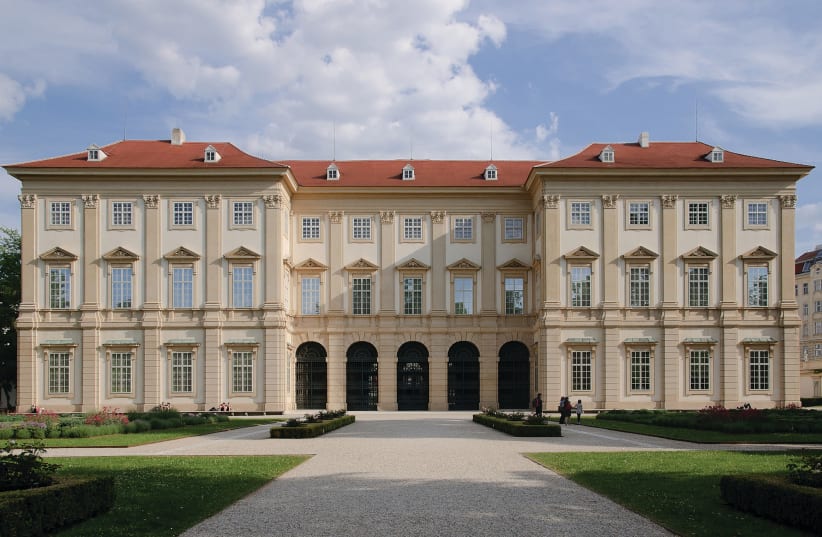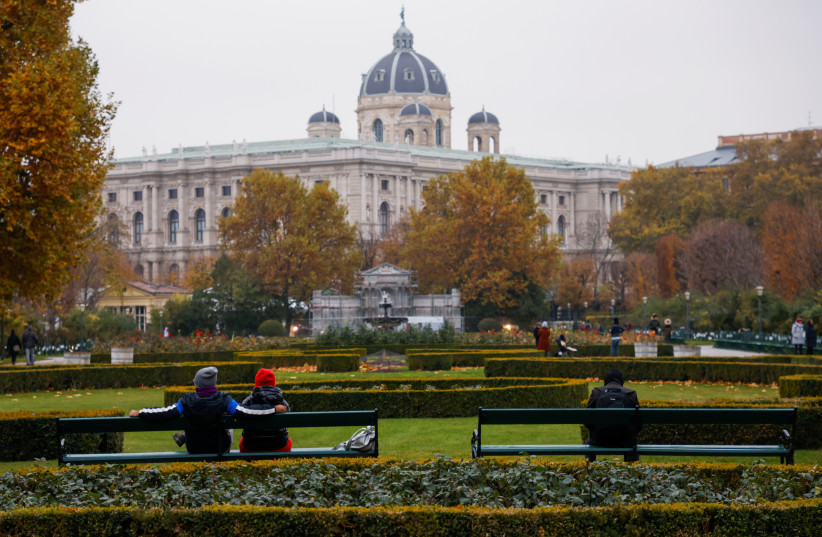It’s not as if I’d never been in a palace before. Depending on the stories they’re covering, journalists get to go to all sorts of places that may elude most of their fellow countrymen and women.
I had been to the Presidential Palace in Warsaw with presidents Chaim Herzog, Shimon Peres and Reuven Rivlin, and in the case of the latter two, had even dined there at a state dinner and later listened to a concert in another reception area.
I had also been to the Élysée Palace in Paris with president Moshe Katsav. But with due respect to Warsaw and Paris, neither compares in grandeur and beauty to the Palais Liechtenstein in Vienna with its magnificent Baroque-style high stucco ceilings replete with ornate crystal chandeliers, and gold décor, elegant old-world furniture, mirrored walls reaching from floor to ceiling and masterpieces of art.
Together with fellow journalists Iris Lifshitz Klieger from Yediot Aharonot, Israel Kasnett of JNS and Stephen Oryszczuk of the British online publication Jewish News, I had been invited by the European Jewish Congress to the unveiling of the Shoah Wall of Names and to the tail-end of the EJC conference at which a summary was given of the EJC’s plan to eliminate antisemitism and all other forms of racism.
The conference was at the Liechtenstein Palace – and so was lunch, which like the palace itself and so much of Vienna, was an aesthetic delight.
The first course, expertly served by well-trained waiters, consisted of marinated burrata surrounded by creamed avocado that had been piped in a scalloped pattern around the edge of the plate and festooned with red and green halves of cherry tomatoes.
The main course was a delicious fillet of Dover sole accompanied by ratatouille, celeriac mousseline, artichokes and rosemary potatoes. Here too the presentation was superb. Dessert was sweet curd strudel, an iced chocolate mousse bar plus a variety of diced fresh fruit on a bed of vanilla sauce.
We had arrived in Vienna late at night. Iris was booked into the Bristol Hotel, and was greeted by the concierge before she even stepped out of the taxi. Israel and I alighted with her, and passing the magnificent Vienna State Opera, walked the two blocks to the Ambassador Hotel around the corner admiring the attractive stores, and the well patronized outdoor coffee shops with their upholstered chairs and their tables covered with snow-white starched cloths.
Unlike in Israel, where the entrance to most hotels is set far back away from the pavement, in Vienna, they are right on the sidewalk, and passers-by can look inside. The white tablecloths were everywhere. At the Ambassador Hotel, they were immediately changed after diners left their tables, and presumably, this was a standard custom at all hotels in Vienna.
The Ambassador looks somewhat like a converted palace, with heavy marble pillars reaching to the ceiling, paintings or more likely hand-painted reproductions of works by famous artists such as Gustav Klimt, gold frames on doorways and coffee tables, along with period-style furniture – and of course the crystal chandeliers, which are a feature of Austrian décor, be it old world or contemporary. The bathrooms however, are ultra-modern.
For Orthodox Jews planning a weekend stay, the Ambassador is perfect, because the keys to the rooms are not of the electronic variety, which means they can be used on Shabbat. The double bed is actually two very comfortable single beds pushed together, which is also a matter of significance for Orthodox Jews.
The breakfast buffet is served in individual glass topped chafing dishes, which are spaced a little apart from each other and include raw vegetables and fruits , so people who keep kosher will have something to eat. Although there was a fair amount of variety on the buffet, it could not by any stretch of the imagination compare with the average breakfast buffet served in Israeli hotels.
My bedroom window was directly opposite the multi-story Peek and Cloppenburg fashion emporium, the international chain of department stores that was founded in Germany 120 years ago. It was exciting to see several floors of display windows almost within reach of my own bedroom window, and I could hardly wait to set foot in the store, which contains mainly women’s, but also men’s clothing, and suits every taste, lifestyle, size and budget from more than €2,000 for a garment to as little as €19.
The most popular color is black followed by various shades of fuchsia and phosphorescent green. But in truth every possible color from the palest neutrals to the brightest hues on the rainbow could be seen on the racks, especially in the more expensive lines featuring the brand names of top French, Italian and American fashion houses.
Padded, quilted coats, jackets and vests are big time in Vienna. Even though the weather was warm and sunny, and there was really no need for a coat, almost everyone in the streets was wearing quilted garments of varying thickness to keep out the cold. Apparently the Viennese dress in accordance with the season and not the temperature.
The streets were extremely clean except for the box-like wooden seats along the square, each separated by only a few meters, and in frequent use. Most hotels and restaurants are smoke-free, so people smoke in the streets, and because it’s not done to butt out one’s cigarette on the pavement, they accumulate between the narrow slats on the seats in the square, and for some odd reason are not removed by street-sweepers.
OUR GROUP of journalists was in Vienna during Kristallnacht commemorations and were taken by bus with members of the EJC to the Judenplatz for a wreath-laying ceremony that was also attended by Diaspora Affairs Minister Nachman Shai on behalf of the Government of Israel.
Along the way, EJC Vice President Dr. Ariel Muzicant, who lives in Vienna, took on the role of tour guide, pointing out a street in which most of the stately buildings are banks, and another street with many palaces, as well as the University of Vienna, the stock exchange, the 150-year-old Parliament Building and other political buildings that were once, in another era, the palatial homes of wealthy Jews.
“Everything is very central,” he explained. Going past in the bus gave us just the briefest glimpse of all the places to which he referred, but we saw bona fide tourists being taken around the city at a much slower pace by horse and carriage. Of course the best way to see Vienna is on foot through this very beautiful city, so steeped in history while interfacing in an unobtrusive fashion with the 21st century.
Just as Israel began preparing for Hanukkah more than a month ahead of time, there were Christmas decorations all over Vienna, the most striking being in the windows of the famed Swarovski crystal shops.
Viennese pastries are famous, and coffee shops featuring much more than apple strudel abound, with displays of mouth-watering cakes lavishly filled or decorated with fresh cream. It’s a place where calorie watchers cast caution to the wind.
Here and there, one hears Hebrew spoken in the street, and we chanced upon Mike, an Israeli taxi driver of Georgian background, whose parents moved to the US when he was young, but he returned to Israel to do army service, married an Israeli woman from whom he is now divorced, but is on a frequent commute between Vienna and Tel Aviv in order to maintain contact with his children.
We asked him about antisemitism, and he said it was not as serious as portrayed by the media. The problem, he explained, is that when there’s one incident, everyone pounces on it, and the media outlets feed off each other, exaggerating the incident out of all proportion.
Mike also drove us to a place near the Ambassador Hotel where they do speed PCR tests for €90 per person. The following day, when visiting Orly Joseph, the remarkable Israel-based spokesperson for the EJC, who was staying at the Bristol, I noticed that just around the corner from her hotel, there was a pharmacy that was doing PCR tests for €60.
We had been informed that without the PCR, we would not be allowed to board the plane. In the final analysis, no one looked at my PCR results, nor when I was leaving Israel did they pay much attention to the tests undertaken less than 48 hours before boarding the flight.
On the way out of Israel, the El Al plane was less than half full. On the way back, it was more than 80% full, and the cabin crew were much friendlier on the way home than on the flight to Vienna.
What amazed us in Vienna was that unlike what all of us had experienced when previously flying home with El Al, was that the check-in counters were not isolated from those of other airline companies, and that security was minimal.
There was no problem entering the area and we did not have to show proof that we were vaccinated. In fact there were hardly any bureaucratic hassles. These started only after we landed at Ben-Gurion Airport, but even then, airport staff went out of their way to be polite and helpful. We encountered a similar attitude wherever we went in Vienna.
If every cloud does indeed have a silver lining, the effect that COVID had on international travel had an extremely positive outcome on service. People in all areas of the travel and tourism industry were so happy to see that revival time has come, that they have been knocking themselves out to be pleasant and polite. It makes travel just that much more enjoyable.
The writer was a guest of the European Jewish Congress.

